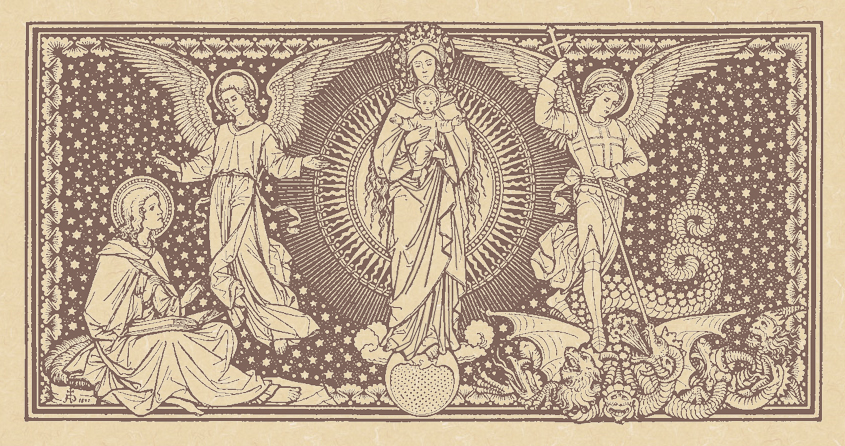The Link of Love with Life.
The Seventh Saturday after Pentecost; or, the Saturday Memorial of the Blessed Virgin Mary.
Lessons from the primary feria, according to the ordinary form of the Roman Rite:
• Sirach 17: 1-15.
• Psalm 103: 13-18.
• Mark 10: 13-16.
|
When a Mass for the Memorial is taken, lessons from the feria as above, or any lessons from the common of the Blessed Virgin Mary.
|
The Fourth Class Feria of the Blessed Virgin Mary on Saturday.
Lessons from the common "Vultum tuum…" of the Blessed Virgin, according to the extraordinary form of the Roman Rite:
• Ecclesiasticus 24: 14-16.
• [Gradual] Psalm 44: 3, 2.
• [Tract] "Gaude, María Virgo…."*
• Luke 11: 27-28.
FatherVenditti.com
|
1:50 PM 3/2/2019 — You may have noticed that our first lesson these last few days has been taken from the Book of Sirach, from that portion of the Bible known commonly as the “wisdom literature.” The Revised Edition of the New American Bible calls it “The Wisdom of Ben Sira” or “The Wisdom of the Son of Sira,” which is, in fact, the earliest title of this book of the Bible taken from the Hebrew name of its author. The Latin Vulgate called it the Liber Ecclesiasticus, meaning “the book of the Church,” because of the extensive use of this book by the early Church in giving moral instruction to catechumens, which is why it's called that even in older English translations today. It was written in Hebrew in the early years of the second century BC, and was translated into Greek by the author's grandson, which is how it came to be known as the Book of Sirach, since Sirach is nothing more than the author's name in Greek.  It was never included in the Jewish Scriptures after the first century, which is why it is not included today in any Protestant Bibles, but the Catholic Church has always recognized it as the inspired word of God. It was never included in the Jewish Scriptures after the first century, which is why it is not included today in any Protestant Bibles, but the Catholic Church has always recognized it as the inspired word of God.
Today's very brief Gospel lesson presents to us a pleasing image: children are brought to Jesus, He lays His hands on them and blesses them. The disciples try to prevent it, and our Lord rebukes them. It's a very common image for Holy Cards: our Lord sitting on a rock or something, with little children crawling all over Him; kind of a cuteness overload.
But these Gospel lessons haven't been put together by the Church over the centuries for the purpose of giving us cute themes for Holy Cards. These three brief verses about our Lord blessing children may seem odd in the sense that, in every other instance, when our Lord lays His hands on someone and blesses him or her, it's because that person is sick or crippled and our Lord is effecting a cure. There's nothing here to indicate that these children are suffering from any kind of malady, which may be the reason that our Lord's disciples try to shoo them away. But I tend to think that the Evangelist included these three verses here because of the Gospel lesson that immediately precedes them, which we heard at Holy Mass yesterday, in which our Lord declares that marriage is forever: the first purpose of marriage is children; without them, the whole institution of marriage makes very little sense from the Christian perspective.
Most everyone who bothers to assist at weekday Mass is someone who is passionate about his or her Catholic Faith; so, I think it's safe to assume that most of us are equally distressed—as well we should be—over the attacks on marriage that we've had to endure in recent years. What may escape our notice, however, is the fact that all this is the direct result of the divorce—no pun intended—of marriage from it's primary purpose, which is the propagation and raising of children in the faith. It’s a sure bet that the high rate of divorce, as well as the high level of acceptance of the notion of homosexual marriage, even among Catholics, is the direct result of the failure of the Church to check—sometimes to even address—the current contraceptive mentality.
But, this is a homily at Holy Mass and not a lecture about Catholic dogma. Let it be sufficient, then, to confine ourselves to the message of the Gospel: that there is an inexorable link between marriage and children,—between love and life—that one is defined by the other, that neither makes sense without the other, that separating one from the other is what has led to the countless perversions from which our society now suffers, and that none of these ills can be healed until the two are reunited in the hearts and minds of all who seek the graces of marriage or children.
That being said, the simple fact is that, through a monumental sin of omission, whole generations of Catholics are ignorant of the truth about marriage and children. It's not their fault, so we must pray for them, as well as for ourselves, taking to heart the words of the Apostle James: “Confess therefore your sins one to another: and pray one for another, that you may be saved” (5: 16 Douay‐Rheims).

* The Tract is non-Scriptural: "Rejoice, O Virgin Mary, Thou alone hast destroyed all heresies. Who didst believe the words of the Archangel Gabriel. Whilst a virgin Thou dist bright forth God and Man: and after His birth Virgin entire Thou didst remain. O Mother of God, intercede for us."
|

